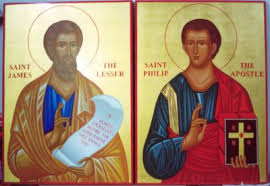Today is the day that Socialists all around the world celebrate socialism. The great system is loved and applauded usually by those who don’t have to live under it. It is a day when people get upset because they can’t find a country anywhere where socialism works. It is devastating and it is a great disruption whenever it is tried. It even messes with the churches calendars. Today is also the day when we remember St. Phillip and James or at least we should.
From Festivals and Commemorations by Rev. Philip Pfatteicher:
Philip was born in Bethsaida, the same fishing village on the shores of Galilee from which Peter and Andrew came. He was one of the first disciples to follow Jesus, and brought Nathanael ( sometimes identified with Bartholomew) to the Lord ( John1:43-51). Apart from his own calling, the story of Nathanael, and mention along with the other Apostles, the only other incidents of his life recorded in the Gospels are the occasion when some Greeks came to him to ask his help in getting an interview with Jesus ( John 12:20-22) and the time Jesus asked Philip how they would be able to feed the crowds ( John 6:5-7).
According to tradition, after Pentecost Philip went first to Scythia to preach the Gospel, where he was remarkably successful, and then to Phrygia where he stayed until his death. He is said to have met his death in the town of Hierapolis in Phrygia(in modern Turkey), according to some accounts by crucifixion and stoning. Traditions also tell of Philip’s two unmarried daughters who survived him, lived to an old age, and were also buried in Hierapolis.
James the son of Alphaeus is usually called James the Less (meaning either “short” or “younger”) to distinguish him from James the Elder, the brother of John, and from James of Jerusalem, the brother of the Lord. The only mention of James in the Scriptures, apart from his name in the apostolic lists, is the statement that his mother Mary was one of those present at the crucifixion (Matt. 27:55 and Mark 15:40), which also tells us that he had a brother named Joseph or the Greek form of the name, Joses.
Details of James the Less’ martyrdom are found in the writings of Josephus, Eusebius, and Jerome. When Festus, the governor of Judea, died, Nero replaced him with Albinus. About the same time, Herod Agrippa II replaced the Jewish high priest Joseph with Ananus. After Festus died and before Albinus had arrived in Judea to replace him, the new high priest decided to pressure James the Less to deny that Jesus is the Messiah and the Son of God. Ananus was taking advantage of a lapse in leadership at the end of Festus’ reign. Similar circumstances at the end of Pilate’s reign over Judea led to the stoning of Saint Stephen.
The Jewish high priest asked James to stand on the Temple wall and speak against Jesus to the crowds which had gathered in preparation for the Passover. James instead spoke in favor of Jesus as the Christ; many heard him and many were converted. So the Jewish religious leaders threw James down from the Temple wall. Yet he did not die from the fall, so they began to stone him. Still he did not die from the stoning, so a man took a fuller club (used to beat out clothing) and clubbed him to death. In this way died James the Less, one of the Twelve Apostles and the leader of the Church at Jerusalem for 30 years.
May 1 has been kept as the feast day of St. Philip and St. James since 561 when on that date the supposed remains of the two saints were interred in the Church of the Apostles in Rome. To counteract the effects of the twentieth-century dedication of May 1 to the working classes and socialism, Pope Pius XII made May 1 the Feast of St, Joseph the Worker, and shifted the feast of Philip and James to May 11. The new Roman calendar commemorates the two apostles on May 3. Lutherans and Anglicans have retained the traditional date.


